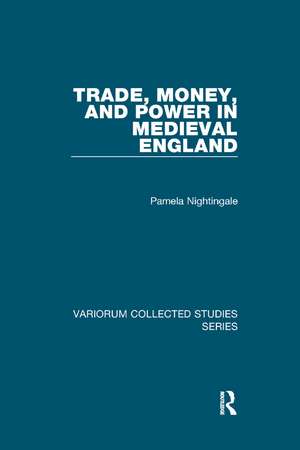Trade, Money, and Power in Medieval England: Variorum Collected Studies
Autor Pamela Nightingaleen Limba Engleză Paperback – 19 dec 2018
Din seria Variorum Collected Studies
-
 Preț: 313.38 lei
Preț: 313.38 lei -
 Preț: 311.41 lei
Preț: 311.41 lei -
 Preț: 308.04 lei
Preț: 308.04 lei -
 Preț: 325.68 lei
Preț: 325.68 lei -
 Preț: 406.12 lei
Preț: 406.12 lei -
 Preț: 311.18 lei
Preț: 311.18 lei -
 Preț: 325.31 lei
Preț: 325.31 lei -
 Preț: 396.01 lei
Preț: 396.01 lei - 9%
 Preț: 1039.89 lei
Preț: 1039.89 lei -
 Preț: 266.20 lei
Preț: 266.20 lei -
 Preț: 358.42 lei
Preț: 358.42 lei - 9%
 Preț: 938.10 lei
Preț: 938.10 lei -
 Preț: 351.48 lei
Preț: 351.48 lei - 9%
 Preț: 938.86 lei
Preț: 938.86 lei -
 Preț: 335.37 lei
Preț: 335.37 lei - 9%
 Preț: 937.14 lei
Preț: 937.14 lei -
 Preț: 351.42 lei
Preț: 351.42 lei -
 Preț: 328.48 lei
Preț: 328.48 lei - 38%
 Preț: 766.84 lei
Preț: 766.84 lei - 23%
 Preț: 315.48 lei
Preț: 315.48 lei - 36%
 Preț: 740.06 lei
Preț: 740.06 lei - 38%
 Preț: 764.20 lei
Preț: 764.20 lei - 39%
 Preț: 684.75 lei
Preț: 684.75 lei - 29%
 Preț: 247.40 lei
Preț: 247.40 lei - 37%
 Preț: 488.89 lei
Preț: 488.89 lei - 38%
 Preț: 766.91 lei
Preț: 766.91 lei - 38%
 Preț: 769.51 lei
Preț: 769.51 lei - 38%
 Preț: 769.85 lei
Preț: 769.85 lei - 36%
 Preț: 823.43 lei
Preț: 823.43 lei - 25%
 Preț: 225.28 lei
Preț: 225.28 lei - 27%
 Preț: 225.54 lei
Preț: 225.54 lei - 38%
 Preț: 767.07 lei
Preț: 767.07 lei - 38%
 Preț: 764.20 lei
Preț: 764.20 lei - 36%
 Preț: 736.38 lei
Preț: 736.38 lei - 34%
 Preț: 738.43 lei
Preț: 738.43 lei - 27%
 Preț: 226.52 lei
Preț: 226.52 lei - 37%
 Preț: 491.66 lei
Preț: 491.66 lei - 37%
 Preț: 485.78 lei
Preț: 485.78 lei - 37%
 Preț: 485.78 lei
Preț: 485.78 lei - 38%
 Preț: 766.34 lei
Preț: 766.34 lei - 36%
 Preț: 739.17 lei
Preț: 739.17 lei - 34%
 Preț: 473.94 lei
Preț: 473.94 lei - 18%
 Preț: 843.63 lei
Preț: 843.63 lei - 38%
 Preț: 774.91 lei
Preț: 774.91 lei - 38%
 Preț: 769.92 lei
Preț: 769.92 lei - 38%
 Preț: 764.20 lei
Preț: 764.20 lei - 50%
 Preț: 488.81 lei
Preț: 488.81 lei - 36%
 Preț: 488.49 lei
Preț: 488.49 lei - 38%
 Preț: 769.10 lei
Preț: 769.10 lei - 38%
 Preț: 766.99 lei
Preț: 766.99 lei
Preț: 449.41 lei
Nou
Puncte Express: 674
Preț estimativ în valută:
86.02€ • 93.47$ • 72.31£
86.02€ • 93.47$ • 72.31£
Carte tipărită la comandă
Livrare economică 21 aprilie-05 mai
Preluare comenzi: 021 569.72.76
Specificații
ISBN-13: 9781138375208
ISBN-10: 1138375209
Pagini: 366
Dimensiuni: 156 x 234 x 19 mm
Greutate: 0.45 kg
Ediția:1
Editura: Taylor & Francis
Colecția Routledge
Seria Variorum Collected Studies
Locul publicării:Oxford, United Kingdom
ISBN-10: 1138375209
Pagini: 366
Dimensiuni: 156 x 234 x 19 mm
Greutate: 0.45 kg
Ediția:1
Editura: Taylor & Francis
Colecția Routledge
Seria Variorum Collected Studies
Locul publicării:Oxford, United Kingdom
Cuprins
Contents: Introduction; Communication through capital and trade: money and the rise of a market economy in medieval Europe; The ora, the mark, and the mancus: weight-standards and the coinage in 11th-century England (parts 1 & 2); The evolution of weight standards and the creation of new monetary and commercial links in Northern Europe from the 10th century to the 12th century; Some London moneyers, and reflections on the organisation of English Mints in the 11th and 12th centuries; The origin of the Court of Husting and Danish influence on London's development into a capital city; 'The king's profit': trends in English Mint and monetary policy in the 11th and 12th centuries; The London Pepperers' Guild and some 12th-century English trading links with Spain; The lay subsidies and the distribution of wealth in medieval England, 1275-1334; Norwich, London, and the regional integration of Norfolk's economy in the first half of the 14th century; The English parochial clergy as investors and creditors in the first half of the 14th century; Knights and merchants: trade, politics, and the gentry in late medieval England; The growth of London in the medieval English economy; Capitalists, crafts, and constitutional change in late 14th-century London; Money and credit in the economy of late medieval England; Monetary contraction and mercantile credit in later medieval England; England and the European depression of the mid-15th century; Index.
Notă biografică
Pamela Nightingale is a member of the History Faculty at the University of Oxford, UK.
Recenzii
’It is a great privilege to review a collection of Nightingale’s collected articles, for she is one of the most wide-ranging historians now working in Britain.... this is medieval economic history at its superb best.’ Economic History Review ’Pamela Nightingale has long made a reputation as one of the leading economic historians of medieval England, with an enviably long chronological range. It is therefore a great service to have gathered here in one volume seventeen of her articles ... we have here a valuable and sparkling collection, one which no serious student of medieval England can aff ord to ignore.’ English Historical Review
Descriere
The sixteen articles in this collection analyse the wealth created by overseas trade and the development of the English economy, during the late Anglo-Saxon period up to the advent of the Tudors. The papers include general surveys of the importance of coinage. They also illustrate how the English crown used its control and exploitation of the coinage as part of a sophisticated fiscal system which helped create the precocious power of the English state. The book also discusses how the wool trade altered the geographical pattern of wealth, and the competing interests involved in the trade in turn caused political conflicts in Parliament and London’s local government.
